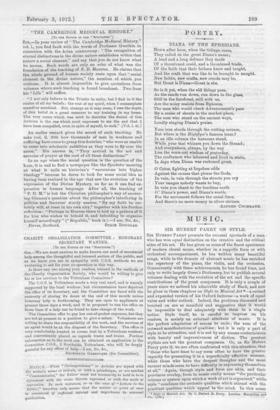"THE CAMBRIDGE MEDIEVAL HISTORY."
[To TER EDITOR Or TUX " EIrrrTATOR.".1
Sin,—In your review of " The Cambridge Medieval History," vol. i., you find fault with the words of Professor Gwatkin in connexion with the Arian controversy : " The recognition of eternal distinctions in the divine nature establishes within that nature a social element," and say that you do not know what he means. Such words are only an echo of what was the foundation of the teaching of F. D. Maurice. He claims that the whole ground of human society rests upon that " social element in the divine nature," the mention of which you criticise. It is almost impossible to give quotations from volumes where such teaching is found broadcast. Two from his "Life" will suffice.
"I not only believe in the Trinity in unity, but I find in it the centre of all my beliefs ; the rest of my spirit, when I contemplate myself or mankind. But, strange as it may seem, I owe the depth of this belief in a great measure to my training in my home. The very name which was used to describe the denial of this doctrine is the one which most expresses to me the end that I have been compelled, even in spite of myself, to seek." (Vol. i. 41.) An earlier remark gives the secret of such teaching. He asks (vol. ii. 350) how thousands of men in weakness and suffering have come to grasp this doctrine," who were as unable to enter into scholastic subtilties as they were to fly over the moon." His answer is, " They arrived in the act and exercise of prayer at the root of all these distinctions."
In an age when the social question is the question of the hour, it is sad to find a newspaper like the Spectator sneering at what it calls an historian's " excursions into higher theology " because he dares to look for some social idea as having been realized in the age that saw the evolution of the expression of the Divine Mystery, as far as it can find ex- pression in human language. After all, the teaching of " F. D. M." is but the Christian philosopher's way of answer- ing Glaucon's question about the philosopher's interfering in politics and Socrates' sturdy answer, "By my faith he cer- tainly will, at least in his own city," together with his further reflection : "Perhaps in Heaven there is laid up a pattern of it for him who wishes to behold it, and beholding to organize himself accordingly " (" Republic," book ix.).—I am, Sir, &a.,










































 Previous page
Previous page